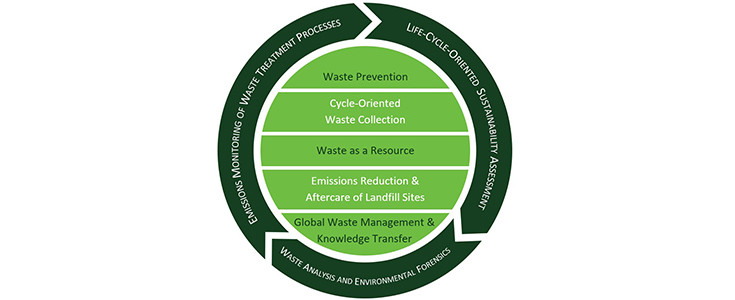Research
Research
According to the three-pillar principle of BOKU (combination of technology, natural sciences and economic, social and legal sciences) we develop innovative concepts, methods and procedures
- for planning and evaluation of waste prevention measures,
- to close natural and anthropogenic material cycles,
- for low-emission waste treatment and
- for the aftercare and monitoring of landfills and old deposits.
The global interdependence of the economy and material flows requires waste flows to be analysed in a comprehensive context and cross-national solutions to be found.
Our current research areas are:

Latest SCI publications
Latest Projects
Research project (§ 26 & § 27)
Duration
: 2025-12-01 - 2029-05-31
The latest nationwide analyses have confirmed that over 60% of residual waste contains incorrectly disposed items or recyclable materials. Reducing this proportion is very important for achieving several EU targets and from the perspective of resource conservation and climate protection. As part of the implementation of a new nationwide analysis concept, monitoring the composition of residual waste by the federal and state governments is becoming increasingly important for effective action planning. As a basis for this, current reporting processes need to be improved, as they do not sufficiently support action planning and evaluation with regard to data visualisation and the identification of easily realisable recovery potential (e.g. by region and waste streams).
The aim of the project is to compare residual waste fractions, waste collection rates, skimming potential and waste collection volumes for municipal groups (e.g. district groups, municipalities with the same collection systems) in the state of Lower Austria in a nationwide, anonymous comparison with structurally similar municipalities using
• interactive dashboards with, for example, diagrams, tables and area cartograms (see Figures 1 and 2) and
• automated, adaptable standard reports
. The database includes residual waste and recyclable material collection volumes, residual waste analysis results, and the most up-to-date data on waste management and settlement structure in Austria.
Research project (§ 26 & § 27)
Duration
: 2025-11-26 - 2026-09-25
As part of national measures to promote the circular economy and reduce environmental impact, the introduction of an extended producer responsibility (EPR) system for textiles is of central importance. The aim is to strengthen prevention and contribute to a transition to a circular economy by increasing the amount of textiles collected separately, as well as the amount of textiles reused, and by recycling textiles that cannot be reused or repaired. In Austria, textiles as municipal waste fall within the regulatory competence of the federal states, so the collection structures are designed differently. The preservation of well-functioning national structures, in which the municipality is responsible as a partner for municipal collection, is a central concern.
The core objective of the project is to develop an in-depth study on the practical design and implementation of an EPR system for textiles. In particular, the study will analyse legal and organisational aspects and develop recommendations for action for national implementation on the basis of existing European requirements.
The following research questions have to be answered, specifically
• which form of an EPR system is best suited to implement the requirements of the Waste Framework Directive in Austria and how the organisation and distribution of responsibilities should be designed taking into account the stakeholders, whereby the system variants fund model, manufacturer-supported model, systems in competition and contract model in analogy with existing systems in Austria (e.g. the Austrian EPR system for waste electrical and electronic equipment) be called upon,
• which design elements of established international EPR systems, e.g. for textiles in France and mattresses in Belgium, can be sensibly transferred to Austria,
• how the municipal structures for the collection of textiles in Austria can be integrated into the EPR system in the best possible way,
• how to optimise system efficiency, taking into account the costs and indicators of the Impact Impact Assessment (EFA) and how to make the greatest possible use of digitalisation via neutral interfaces, in order to reduce administrative burden and costs, and
• which factors have a positive effect on an increase in the proportion of re-use.
Research project (§ 26 & § 27)
Duration
: 2025-12-01 - 2027-02-28
The implementation of a sustainable energy transition requires increased use of already sealed or anthropogenically influenced areas for the generation of renewable energy. In connection with this, the development of the Climate Neutrality Roadmap 2040 for the city of Leoben (one of 37 pioneering small cities in Austria) revealed that the Seegraben landfill, decommissioned in 1996, in the city of Leoben (Styria, Austria) has significant potential for the construction of a photovoltaic (PV) ground-mounted system due to its topographical location, area size, and infrastructural connectivity. Consequently, the city has set the goal of utilizing this potential to achieve climate neutrality by 2040.
The project is the first to develop an integrated multi-benefit approach for urban landfill PV systems:
1. Integrated Methane Oxidation Windows: Systematic integration of biowindows between PV table rows to ensure sufficient CH₄ reduction.
2. Participatory Brownfield Lab: Structured involvement of local residents, stakeholders, and citizens, with gender- and generation-specific evaluations, visualizations, and feedback opportunities.
3. Biodiversity-PV Synergy: Development of a vegetation strategy that combines erosion control, methane oxidation, and biodiversity enhancement.
4. Publicly Accessible Replication Package: All results will be systematically prepared for nationwide reuse in Austria and published on klimaneutrale-stadt.at.
